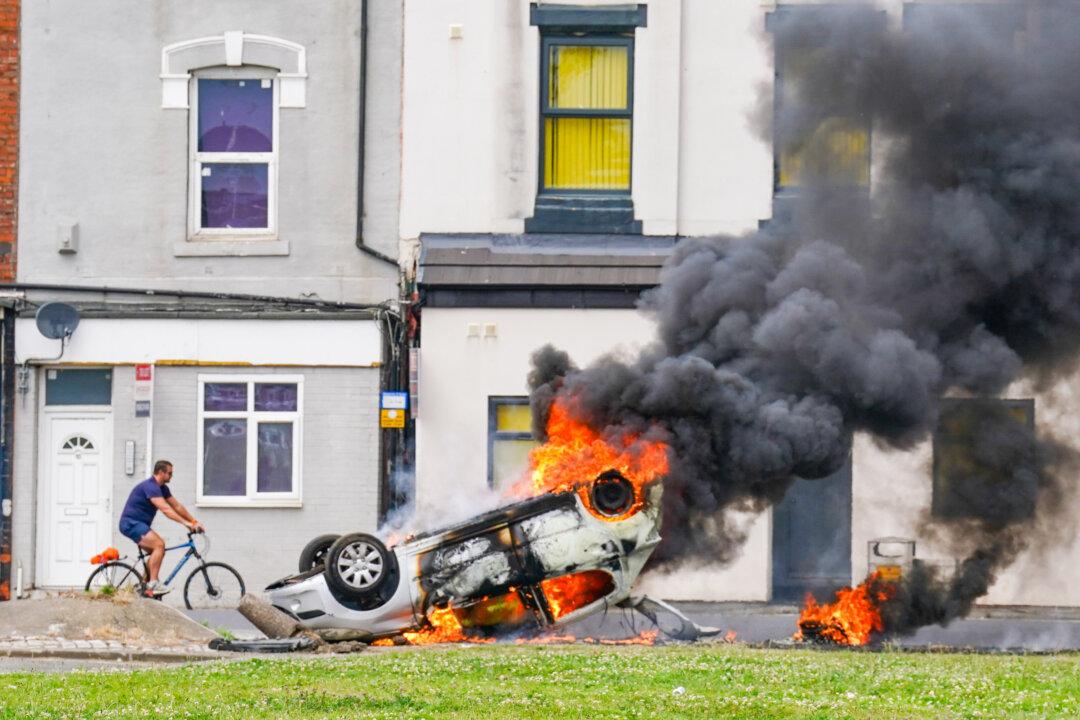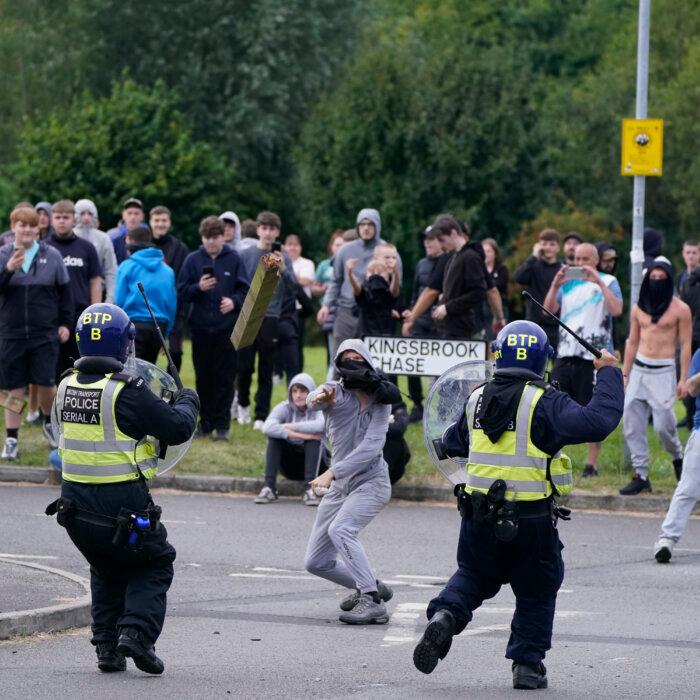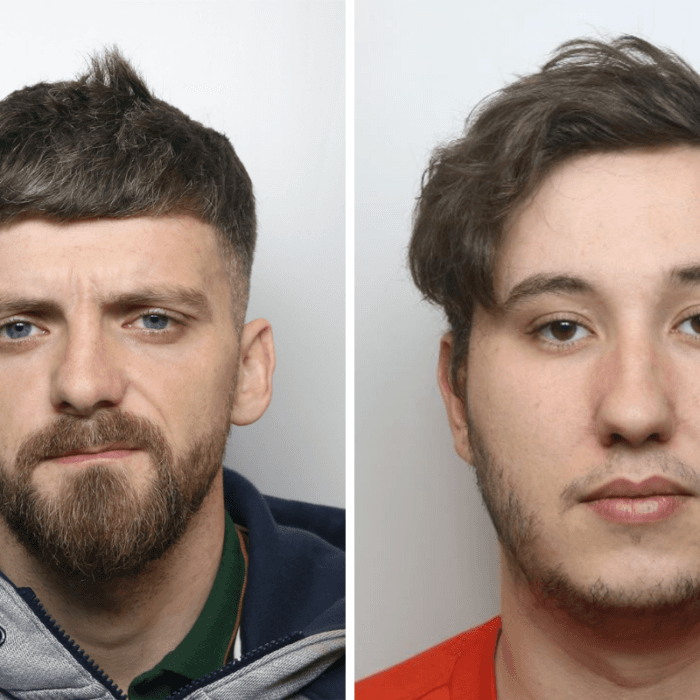In the aftermath of the violent UK riots, authorities have been charging individuals for crimes both online and offline, ranging from violent disorder to incitement of racial hatred.
After Elon Musk publicly clashed with UK Prime Minister Keir Starmer on social media platform X, the policing of social media quickly became a global focus of the UK riots—along with cases of people sent to prison over social media posts.
While some of the swiftly-meted-out convictions have been solely based on social media posts, the majority of the arrests, charges and convictions have been for violent crime and disorder.
Nearly all prosecutions over social media posts so far have not been under the new controversial law designed to bring the online world to heel—but via 38 year old legislation.
So, what laws are being broken by those involved in the riots, and by those who have done nothing more than post on social media?
The Crown Prosecution Service told The Epoch Times they do not have a definitive breakdown of data with every single conviction and arrest by type, and arrests are still being made and charges brought. But the details of charges and convictions so far do provide a snapshot.
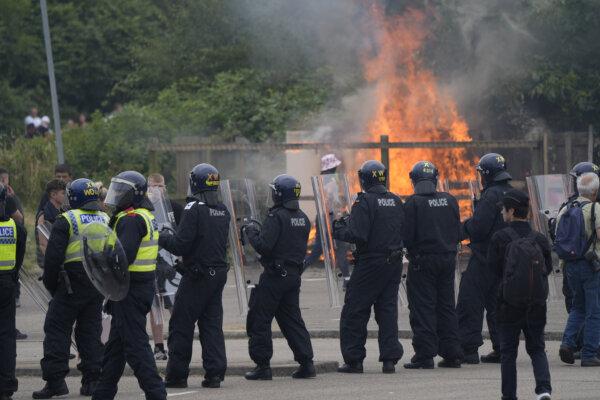
Violent Crimes
The violence was widespread as people took to the streets.Mosques in at least four English cities were targeted. Hundreds also gathered near a Holiday Inn Express hotel used to house asylum seekers near the northern town of Rotherham, with some attempting to set it on fire.
This was on top of countless attacks where bricks and fireworks were launched towards police officers.
Street violence also increased as footage of Muslim gangs attacking white people went viral.
Public Order Act
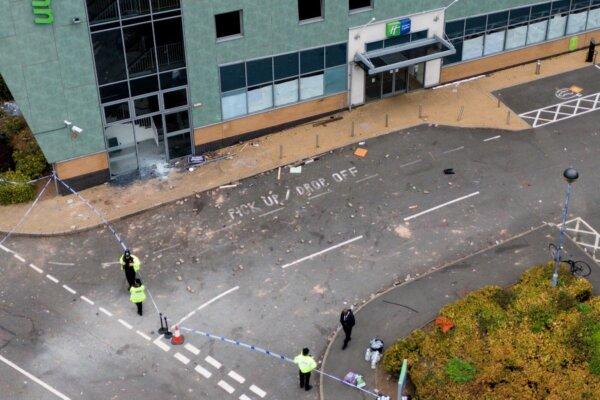
In response, British authorities, including the police, Crown Prosecution Service (CPS), and the Home Office, took rapid action across the justice system to arrest, charge and jail those involved.
Many of the actions taken have stemmed from offenses outlined in the Public Order Act 1986, a British law designed to prevent and address behaviors that threaten public peace.
In that law, incitement, provoking violence and harassment offenses, which predate social media companies such as Facebook, Telegram and X by almost 20 years, apply both on and offline.
According to the National Police Chiefs’ Council, to date, 927 arrests and 546 charges have been made across the UK in connection with the ongoing disorder since July 29.
For example, John Honey, 25, in Hull, pleaded guilty to violent disorder, burglary, and racially aggravated criminal damage. He also pleaded guilty to the racially aggravated criminal damage of a BMW and damaging nine other cars.
A 13-year-old girl, pleaded guilty to violent disorder at Basingstoke Magistrates’ Court on Tuesday following a protest outside Potters International Hotel in Aldershot on July 31.
The girl, who cannot be named for legal reasons, admitted threatening unlawful violence that would cause a person to fear for his or her personal safety.
Jason Barry Francis, 38, was jailed for two years after pleading guilty to violent disorder and assault of an emergency worker at Bournemouth Crown Court on Monday, Dorset Police said.
Francis was seen in local council CCTV footage and on social media moving towards a police line, pushing and kicking out at police before punching an officer in the face and backing away into the crowd.
Sameer Ali, 21, was jailed for 20 months for affray while Adnan Ghafoor, 31, was jailed for 18 months for the same offence committed in Leeds City Centre. They had attended an anti-racism demonstration while an anti-immigration protest was happening at the same time.
“It is against that background that both of you involved yourselves in violence in the street, in Leeds. The violence used by you and others was unlawful. Not only did you violently attack others in the street, but this was witnessed by people in a nearby bar, on the pavement and in cars. They will have been shocked, fearful, upset and distressed by your actions,” he said.
Stirring up Hatred
The act, which is just less than forty years old, also includes provisions against publishing or distributing written material intended to stir up racial hatred, This is being used to charge online material.The initial focus of the role of social media was because the riots were partly fuelled by inaccurate claims that a triple-child murder stabbing suspect was a Muslim illegal immigrant on a terror watch list, which spread online.
But the convictions so far have not been for repeating the posts that sparked the unrest, but for other specific incitements.
Others have been convicted or are awaiting trial under communication offenses specified in the Communications Act 2003.
Jailed For Comments on Social Media
Dimitrie Stoica, 25, who falsely claimed on a live-streamed TikTok video that he was “running for his life” from rioters in Derby was jailed under the Online Safety Act—a new and controversial set of online laws designed to protect users and combat harmful content online.Stoica’s stream had come to the attention of officers monitoring social media from the area. However, he confirmed to police that he was not being chased and was not afraid for his safety.
Stoica had been livestreaming to 700 followers as he walked around Derby on Wednesday 7 August – the same evening that potential protests and disorder had been feared might take place in the city and admitted that his comments had been a “joke.”
Punishment and Deterrence
The sentences are intended to provide “both punishment and deterrence,” said a judge.“Quite simply, those who deliberately participate in such disorder, causing injury, damage, and fear to communities, will inevitably be punished with sentences designed to deter others from similar activity. Other offenses, such as criminal damage, arson, threatening behavior, or assault committed in the context of widespread disorder, will be regarded as aggravated forms of that offending,” he added.
Parkinson told PA Media what may be considered a terrorism offense could be about named individuals or immigration law firms, for instance, and encouraging activity affecting those individuals.
2011 Riots
The recent riots have drawn comparisons to the 2011 unrest, when almost 4,000 people were arrested for being involved in the disorder from Aug. 6 to 9, 2011.These riots and looting, which spread across the country, were triggered by the police shooting of Mark Duggan, a 29-year-old black gang member, in Tottenham.
Overall 13 percent of arrestees (417) were reported to be affiliated with a gang, 46 percent were black (including mixed black background), 42 percent were white, 7 percent were Asian, and 5 percent were from some ‘other’ ethnic group.
Just over three-quarters (76 percent) had a previous caution or conviction, including a significant proportion (26 percent) with more than ten previous offenses.
